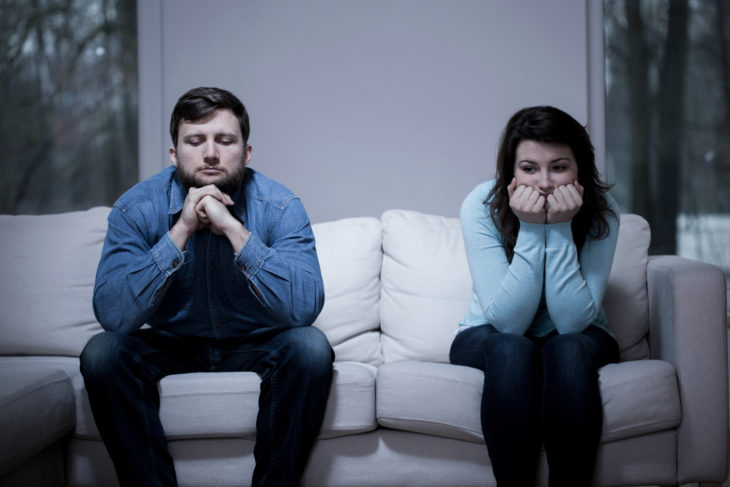I’ve been in therapy for, oh, almost four years, I think. I go once a week, for 45 minutes. I spend a lot of time talking about myself, obviously—issues I have from the past that I need to work on because they’re affecting me in the present (and potentially the future), as well as the usual topics I need to vent about (work, money, family, etc.) so I don’t go postal. But mostly, I talk about boys.
When I say I talk about boys, what I mean is that I talk a lot about the issues the dudes in my life are having, how they’re affecting me and, thus, us, and how improvements need to be made in order for them to be better partners. I play amateur psychologist during my little 45 minute sessions each week with my doc, diagnosing each and every one of these boyfriends based on the knowledge I’ve gathered as a patient myself. I have evolved and healed in innumerable ways through my own treatment. I was (almost) fixed, so let me fix them.
I have found myself identifying certain dealbreakers early on, analyzing the s**t out of them, and then doing whatever I can to inspire (and maybe badger) these gentleman to change in a way that is most beneficial for themselves and, thus, us.

Source: Pinterest
My shrink pointed out this tendency I have to “fix,” help, and change the men in my life during yesterday’s session. “Have you ever thought of trying to accept so-and-so for how he is, not how he could be?” she asked me.
“Well,” I said, “I don’t know.”
I first started therapy at the behest of my ex-fiancé, after I hit him during a fight. I spent a year seeing a male therapist, but I hated it because his voice bugged me—it was too smooth, like oozing honey—and, um, he had a dick and I really wasn’t comfortable. It took me way too long to stop seeing him, mostly because it felt like dumping someone and it gave me enormous anxiety that I might hurt his feelings. I went about six months without therapy, until I started up again, this time with a female therapist (the one I still see), because, among other reasons, my ex thought I had sexual issues. (I didn’t. He was just lazy and chubby and thus unattractive to me.)
Dr. A and I tackled a lot of my Big Issues the first few months. My Dad. That was a big one and not fodder for this blog. My Liberal White Girl Guilt about making more money than my parents. Some Other Stuff that’s too personal to get into. All of these things were, of course, affecting my relationship with my now-ex (who was my live-in boyfriend/fiancé).
But then I started talking about him. And his issues. And how they were affecting me and, thus, us. One of the things I realize in the aftermath of our breakup is that I did not for a second allow myself to consider that maybe we weren’t right for each other, that I couldn’t put up with his issues—and believe me, he had A LOT. Instead, I spent a lot of time in therapy talking and thinking about how I could adjust myself to how he was and the things he would do. I never considered that I could demand that he change and that if he didn’t, I could and would move on.

Source: imgflip.com
When things ended incredibly abruptly (his choice entirely), my world was seriously rocked. As time has gone by, I’ve gained a lot of clarity about what happened and also acknowledged that I was seriously stifling my own doubts and concerns about our relationship for a very long time. As a result, I’m hyper-conscious of making sure that kind of pain—and those sorts of mistakes—doesn’t happen again with another man that I let into my heart. I have found myself identifying certain dealbreakers early on, analyzing the heck out of them, and then doing whatever I can to inspire (and maybe badger) these gentleman to change in a way that is most beneficial for themselves and, thus, us. I don’t count on them changing—I’m not at the place yet where I fully trust anyone—but I get my expectations in order early. If they’re not met, well, in theory (not always in actuality), I’m outta there before I get hurt.
I’ve long been drawn to men who are self-loathing, tortured, and moody. My therapist says that’s likely because I’m passionate and am drawn to other passionate types, many of whom are those three other adjectives as well. I try to avoid the self-loathing dudes, but eventually they all reveal themselves to have that much in common, if nothing else.
My current romantic entanglement is kind of up and down. Amazing and wonderful and blissful and fun for a chunk of time—and then hurtful and ego-bruising. There is definitely an aspect to him that I don’t like, but it’s small compared to the rest of him that I love and adore. For the last month or so I’ve talked about him in therapy, the issues he’s having, the mood swings he has, all with the end goal, seemingly, of figuring out what I can do to help him, and thus, us. I should know better—from my own experience and watching other people I know try—that you cannot save anyone and it’s fruitless to try and change someone into the best person YOU think they can be.
“So,” Dr. A started, “Do you think you can accept him and love him and be with him as he is, not as you think he could and should be?”
“I don’t know,” I replied. And I still don’t, but I suppose I will find out.
Original by Amelia McDonell-Parry
